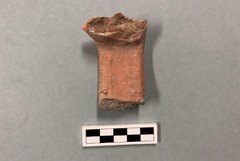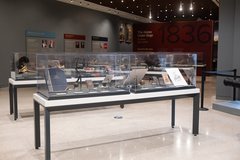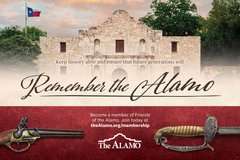This artifact was recovered during excavations associated with the north side of Church. The artifact is a fragment of a pottery handle, belonging to a type of pottery called Goliad Ware.
Goliad Wares are a common pottery type encountered many sites in Texas. This type of pottery is manufactured using local clays that are tempered with burned bone or shell to prevent the vessel from cracking when fired. The vessels are handmade, usually by the coil method, by indigenous populations of the region.
This ceramic making technology was used by the Native American groups that inhabited much of Texas prior to the arrival of the Spanish. At sites that do not have a historic component, the pottery type is referred to as Leon Plain. At sites that have a historic component, such as a Spanish Colonial Mission, the pottery type is called Goliad, named after the location of the earliest encounters of the pottery type at a Spanish Colonial site.
Goliad Wares were manufactured throughout the entire Spanish Colonial period. There tends to be a greater quantity of Goliad sherds recovered at mission sites in comparison to presidios or villas, but the ware is found at all sites with a Spanish Colonial occupation.
Colors of Goliad Ware vary from black or brown to brick red. The color is dependent of the heat created and oxygen levels during the firing process. Since firing occurred in open fires, vessels could exhibit all colors. This handle measures approximately 2.75 inches in length and 1.1 inches wide.



